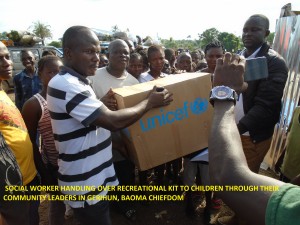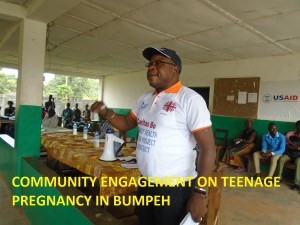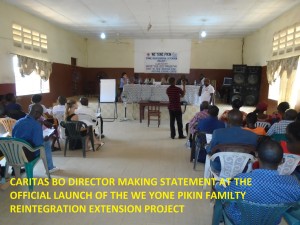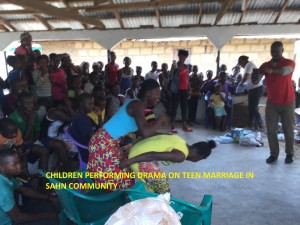POST EBOLA RECOVERY AND REINTEGRATION OF RURAL POOR AND VULNERABLE CHILDREN IN SOUTHERN SIERRA LEONE
DESCRIPTION OF PROJECT SETTINGS
To what extent has the project changed the situation, compared to how it was at the start? The context as it was?
Caritas Bo’s School feeding project contributes to the education and well-being of children. A hungry child does not grow, cannot learn as well and faces many health risks in the future. The School feeding brings children into school and out of hunger.
Our intervention through activities of the school feeding responds directly to the Sustainable Development Goals (SDGs) Goal 1: No Poverty, Goal 2: Zero Hunger, Goal 3: Good Health and Well-Being Goal 4: Quality Education Goal 5: Gender Equality
The School Feeding project intervention leads to outcomes that are mutually reinforcing, helping to lift households out of poverty to end the inter-generational cycle of hunger our intervention facilitates education- and education, particularly for girls, leads to improved food security, health and nutrition, the effects of which all contribute to ending hunger.
Feedback from heads of schools from the 50 target schools within the two target districts proves that, school pupils performed remarkably well when compared to non-target schools within the two districts. Interventions on school feeding within the project contributed immensely to the improved promotional examination result this clearly indicate that the initiative further improved on the cognitive abilities of the children, improved health conditions, improved school attendance and increased academic performance.
Providing food for consumption at school can relieve immediate short-term hunger which is very beneficial for learning. Alleviating short-term hunger among children at school helps to improve performance on school tests and promote normal progression from grade to grade in completing a basic education.
Project intervention helps close the gender gap in schools and helps to empower women by increasing their probability of house hold income through its Savings and Loan Scheme (VSLA).
Caritas Bo realizes that when girls are educated they are more likely to have fewer and healthier children and to head families that are food-secure. Maternal and infant mortality rates will decrease and better- educated girls will make more informed choices.
The Power of school Feeding/what is changing
Current project intervention is far more than food-giving. They are an investment in the country’s most vulnerable children. They are an investment in our common future and national stability. Activities carried out can bring children into school and out of hunger. Strong partnerships networking increase factors that pull children to school.
Overall, school feeding programs have directly increased the educational and nutritional status of recipient children, and indirectly impact the economic and social lives of themselves and their family. Basic education is seen as a necessary condition for development. In addition, it is seen as a right for every child. In rural schools through the intervention of project activities, many schools have enrolled lots vulnerable pupils whom their parents are poor and some are totally orphans.
Through project activities (sensitization and awareness raising), project stakeholders which includes, the Head of Family Support Unit of the Sierra Leone Police in the two district, (FSU) District representative for the Ministries of Social Welfare Gender and Children’s Affairs and ministry of Education of Education Sciences and Technology, Community Child Welfare Committee members, (CWC) Head Teachers, School Management Committee members, (SMC) Children’s Forum Network (CFN) have all been trained on the Child Right Act, Gender and Domestic violence issues and have all re-iterated their commitment in protecting the right of the child. This has led to increase in the knowledge base on child protection issues.
The project is a springboard for many positive outcomes for poor children and their families. It also engages parents and communities in the promotion of public health, Education and the creation of an independent future. Few safety-net programmes provide so many multi-sector benefits- education- gender equality, food security, poverty alleviation, nutrition and health – in one single intervention.

Partnership and Collaboration during project implementation
Partnership is key to the success of any project implementation including our current school feeding project intervention. Caritas School feeding project complement education interventions. Educational provision, in quality and quantity, must be able to respond to the increased demand resulting from school feeding projects. With national governments in the lead, local non-governmental organizations, international agencies and donors must increase commitment to education and work together to coordinate the wide spectrum of interventions that make this commitment real. Since the inception of project activity implementation, Caritas Bo has been working together with partners in ensuring the protection and wellbeing of children. Caritas Bo has been closely working with the ministry of education, ministry of agriculture, ministry of health and sanitation, ministry of social welfare gender and children’s affairs District Councils and other local, national, and international organizations to promote the school feeding project.
School feeding project helps children to go to school and invest in their own future and the future of their communities and country as well. These children represent the future: they will be the future graduates – who will change the destiny of their countries. Project team concentrates its efforts and funds on the neediest beneficiaries and communities. Working with stakeholders, government, communities and schools, Caritas Bo targets the most food insecure and vulnerable children. The framework Caritas Bo uses includes the areas presented in the figure below.

“During school visits, I have noticed that
food plays an important part in the success of students”
Director Caritas Bo. Quarterly monitoring visit. Feb.2019
There is ample evidence to support two simple truths: food attracts poor children to school and education helps break the cycle of poverty. Our project intervention concentrate on breaking the vicious poverty cycle by investing in child development, using food to get children to school and keep them there.
PROJECT INTERVENTION BREAKS THE POVERTY CYCLE
A joint cost-benefit analysis undertaken in 2009 by The Boston Consulting Group and partners compared costs in Ghana, Kenya, the Lao People’s Democratic Republic and Zambia related to the design, implementation and delivery of feeding in schools with the benefits arising from the three major outcomes: increased education, improved nutrition and health, and value transfer to the beneficiaries. The findings revealed that introducing feeding in Schools improve enrolment, attendance and cognition, decreases drop-out and morbidity; and enhances disease awareness. These lead to increased wages, a longer productive life which together lead to increased lifetime
earnings. School meals and take-home rations if applicable translate into savings at
Household level, which can result in increased returns on investment. The analysis also highlighted the reinforcing and multiplication effects between the various outcomes that make school feeding unique. The study pointed to two
conclusions:


- Investing in and introducing feeding in schools Creates significant economic value;
- Providing food in school is a unique safety net Driven by the interdependency between various outcomes, and combines short, medium, and long-term benefits.
School Feeding Project direct Beneficiaries
While Caritas Bo is the development wing of the Catholic Diocese of Bo, it is also the largest provider and implementer of school feeding project from a non-governmental organization in the southern region of Sierra Leone. The governments have the greatest potential to reach hungry school children all over the country through its national school feeding secretariat and the national school feeding program. Since it was founded, Caritas Bo has provided food to school children as a way of contributing to child development. The project intervention has provided food for a total of 10000 pupils in 50 primary schools in Pujehun and Moyamba districts. Food is provided three times a week i.e. Mondays, Wednesdays, Thursdays or Fridays.

There is a steady increase in number of enrolment from previous year to current year.
There is also an increase in enrolment for girls than boys.

7103 out of 7873 pupils passed 2017/2018 academic years promotional examinations while
77 failed promotional examination.

Action Now /Recommendation
´Only when governments, international institutions, and civil society work together unstintingly can we ensure that all girls receive an education”. (Prime Minister of Senegal, Mr. Souleymane Ndéné Ndiaye – United Nations Girls’ Education Initiative global conference ‘Engendering Empowerment: Education and Equality’, May 2010, Dakar)
The present situation demands urgent action. Millions of children are still denied an education and most of them are girls… Taking a rights based approach to education requires us to
know who is not in school, to find out what it will take to get them and keep them there—and then to make it happen… (Ms. Cheryl Gregory Faye,” Head of the UNGEI Secretariat)
Project intervention contributes to getting more girls into school and keeping them there. The project is a partial reimbursement to parents for the opportunity cost of their girls being in school. Action by all partners is needed
to work on both the pull and push factors for girls’ education.
To reach more children in need, Current project activities have to be sustainable. Through sustainable project intervention, more school children will be lifted out of hunger, more children will go to school, more poor families will benefit from productive safety nets, more impact will be
made on child hunger, universal education,

and gender equality and eventually poverty reduction. Government should be in the lead to create a new generation of school feeding projects as productive safety nets, targeting food insecurity and encouraging local production. Governments must eventually own and fund school feeding initiatives as part of their own long-term strategies to end hunger.


International Non-Governmental Organization should continue its support to National Organizations and structures including schools both at community and at district level in a bid to ensure proper exit planning as well as in design and implementation of targeted, cost-effective, nutritious school feeding programmes as part of a comprehensive essential package and which are aligned with eight quality standards for sustainability . We need to act now to make subsequent years different from today especially at the end of project duration with more children in schools.

CHILD PROTECTION
Children globally are considered as one of the most vulnerable groups. Responding to their needs, promoting their rights and upholding the fundamental principles aimed at reducing their vulnerability while supporting their development is a principal cause of action for Caritas Bo.
Key among their protection needs are access to food, shelter, clothing, housing, Healthcare, quality primary education, protection from abuse, exploitation, neglect deprivation and living in unsafe environments.
The natural disaster of Ebola has affected 2,054 children (966 Boys & 1088 girls) in Bo, Bonthe, Moyamba and Pujehun Districts. 751 have been orphaned (336 boys, 415 girls) . Caritas Bo with Support from Catholic Relief Services, actively engaged in social mobilization, awareness raising aimed at behaviour change and increase of knowledge on the prevention of EVD and setting up of hand washing stations in all 15 chiefdom in Bo District.
Caritas Bo has won a grant of $ 715,410,950.00) from CRS for the “We Yone Pikin family Reintegration Extension Project” in Bo District that will run for 18 months from January 1st, 2017 – June 1st 2018. The expected results are to see that foster families are provided with improved parenting to EVD affected children, EVD affected children are better able to cope with their situation and community Leadership is better able to protect children. This project will be implemented in close partnership with MSWGCA as government ministry overseeing all child protection issues in Bo District.
In Bo District, UNICEF supported Caritas Bo with a grant of $148,307 to support children and their families in the recovery process. As part of the reintegration and recovery process, 1000 children were provided with psychosocial support. Family Tracing and reunification were conducted in 15 chiefdoms: kakua, Gbo, Selenga, Tikonko, Komboya, Badjia, Niawa Lenga, Valunia, Baoma, Wonde, Jaiama Bongor, Bagbo, Lugbu, Bumpeh Gao, and Bagbwe chiefdoms. These actions were jointly carried out in collaboration with the Ministry of Social Welfare Gender and Children’s Affairs and closely with community structures like the village Development Committee (VDCs,) Child Welfare Committees (CWCs), and Mother’s Clubs. We were able to train 273 (194-males and 79 females) VDCs to increase their knowledge on child protection issues. Caritas Bo, through funds provided by UNICEF, supported life skill training for 1,250 Children (601 boys and 649 girls). children were taken through sessions of managing peer pressure, building self esteem, negotiation, communication, decision making process and building of good social relations at community levels. Caritas Bo provided PSS to 1,453 children (732 boys and 721 Girls).Play was very useful providing therapeutic solution for psychosocial needs for some children. Recreational activities also provided the children with the time and opportunity to interact with peers and ease away their worries.
PHOTO SHOWING PARTICIPANTS OF VDC TRAINING
Caritas Bo, also runs a Children’s Home which is located in the Saint Theresa’s Parish in Bo. The Saint Mary’s Children’s Home has been in existence since 1989. The home caters for orphans and very vulnerable children providing a safe, loving and caring home with both mother and father figures in residence. It has a capacity to house 30 children in accordance with the minimum standards set by the ministry of social welfare gender and children’s Affairs in the National alternative care policy. The Home provide a safe and caring environment for 38 child ebola survivors when no other home in Bo District was willing to receive these survivors even though MSF declared them safe, well and non contagious.
The children’s home is funded from donations from friends and charities among which is the Saint Mary’s Children’s Home charity in Australian, The Healey Foundation, Individual family members, parishioners and The Catholic Bishop of Bo. Why not donate and be part of this soul saving initiative of the catholic Diocese of Bo?



